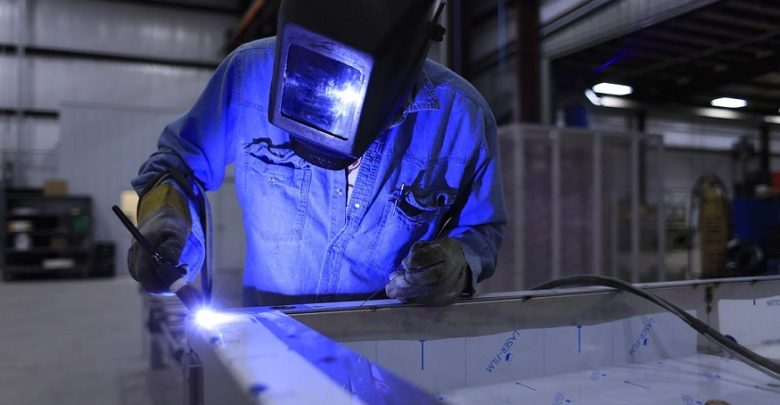Industrial applications for welding

Welding is looked upon as a traditional industry, and that is far from the truth. Welding is in fact a very interesting industry that is continuously evolving in technology and coming up with newer and more efficient ways of welding.
Almost any metal product that we use, small or big, requires some amount of welding. There exist around 30 different methods of welding. Up till the end of 19th century, forge welding was prevalent and that changed drastically as the world wars happened, which paved way for technological advancements in all fields and welding happened to be one of them. Welding methods that are more cost-effective, give more precision as well as produce better quality welds, were introduced then. These are arc welding processes like shielded metal arc welding or SMAW welding and gas metal arc or MIG welding. These processes remain popular even today as they can be mastered easily and have a wide variety of applications.
Welding material and its applications are found across industries. MIG welding and SMAW welding are two important types of welding found across all these industries. Let’s talk about them now.
- Aerospace
An airplane cannot possibly exist without welding. The aerospace industry has lots of space and use for welding. The first ever commercial aircraft could not have been created without the help of welding. The most common method used earlier was gas welding. It is still in use but for a good part of the production process, it has been replaced by electrical arc welding methods like shielded metal arc welding or SMAW welding.
Another fun fact about aerospace applications of welding is that TIG or tungsten inert gas welding was developed by the aerospace industry to work with magnesium. Metal inert gas welding or MIG welding is used more popularly by engineers for airplane manufacturers.
2. Construction
Construction is an industry that requires a lot more steel than any other industry. Of course, this construction refers to buildings, bridges and other infrastructural improvements or creation. MIG welding works the best in such requirements as it is the most efficient in joining non-ferrous metals as well as intensive work requiring steel. While this is the most widely used method of welding for construction, shielded metal arc welding is a more cost-effective alternative. SMAW welding, having been in the game for so long, is more accessible and welding materials are also cheaper.
3. Railway
Railways is an industry which is completely dependent on welding. Welding is a crucial part of the entire railroads industry. Shot welding, a type of spot welding, was what was used in the early 1900s. Gas welding as well as electric arc welding are other welding methods that are commonly used for railways.
4. Mass production
Manufacturing of anything and everything that is mass-produced requires welding, and uses MIG welding. As we can gather by now, MIG welding is very versatile and is applicable to a variety of practices and industries. Referring to mass production, this is cost effective and thus, for this kind of an industry, it yields higher outputs.
Be it computer parts, furniture or any types of tools, anything that has more than one piece of metal, MIG welding and its welding materials will be of use to it.
We hope this blog article has helped you understand different applications of welding in various industries and how it helps us all in ways we cannot see with the naked eye.




